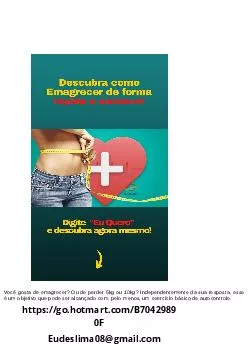PPT-Advanced Search Techniques for Health & Life Sciences
Author : briana-ranney | Published Date : 2015-09-16
This presentation will introduce you to advanced search techniqes for locating evidencebased scholarly resources for your subject area including Resources Available
Presentation Embed Code
Download Presentation
Download Presentation The PPT/PDF document "Advanced Search Techniques for Health &a..." is the property of its rightful owner. Permission is granted to download and print the materials on this website for personal, non-commercial use only, and to display it on your personal computer provided you do not modify the materials and that you retain all copyright notices contained in the materials. By downloading content from our website, you accept the terms of this agreement.
Advanced Search Techniques for Health & Life Sciences: Transcript
Download Rules Of Document
"Advanced Search Techniques for Health & Life Sciences"The content belongs to its owner. You may download and print it for personal use, without modification, and keep all copyright notices. By downloading, you agree to these terms.
Related Documents














